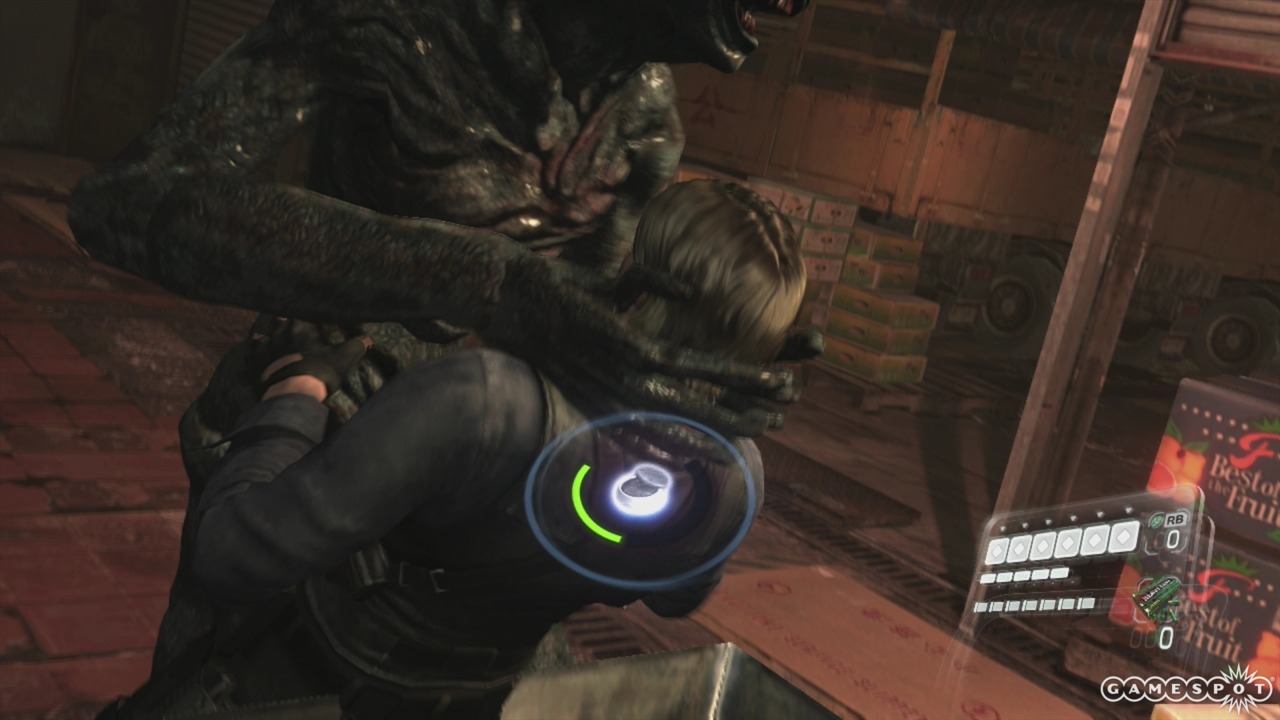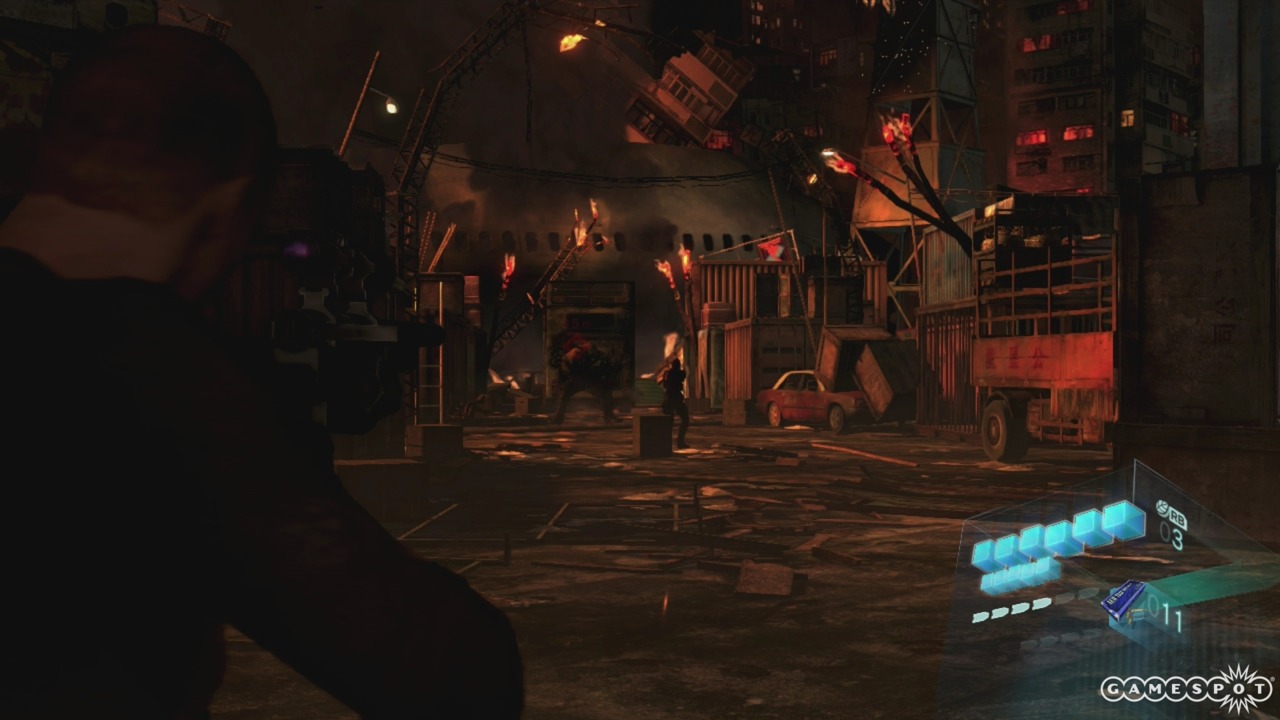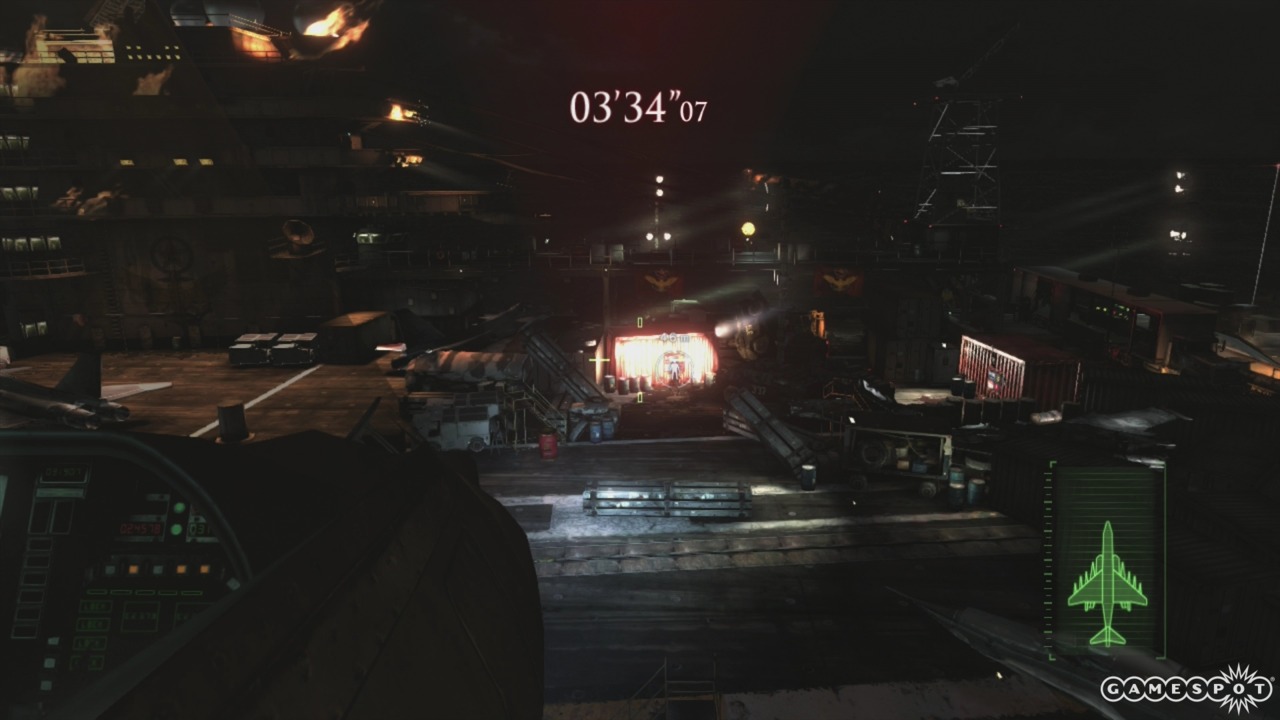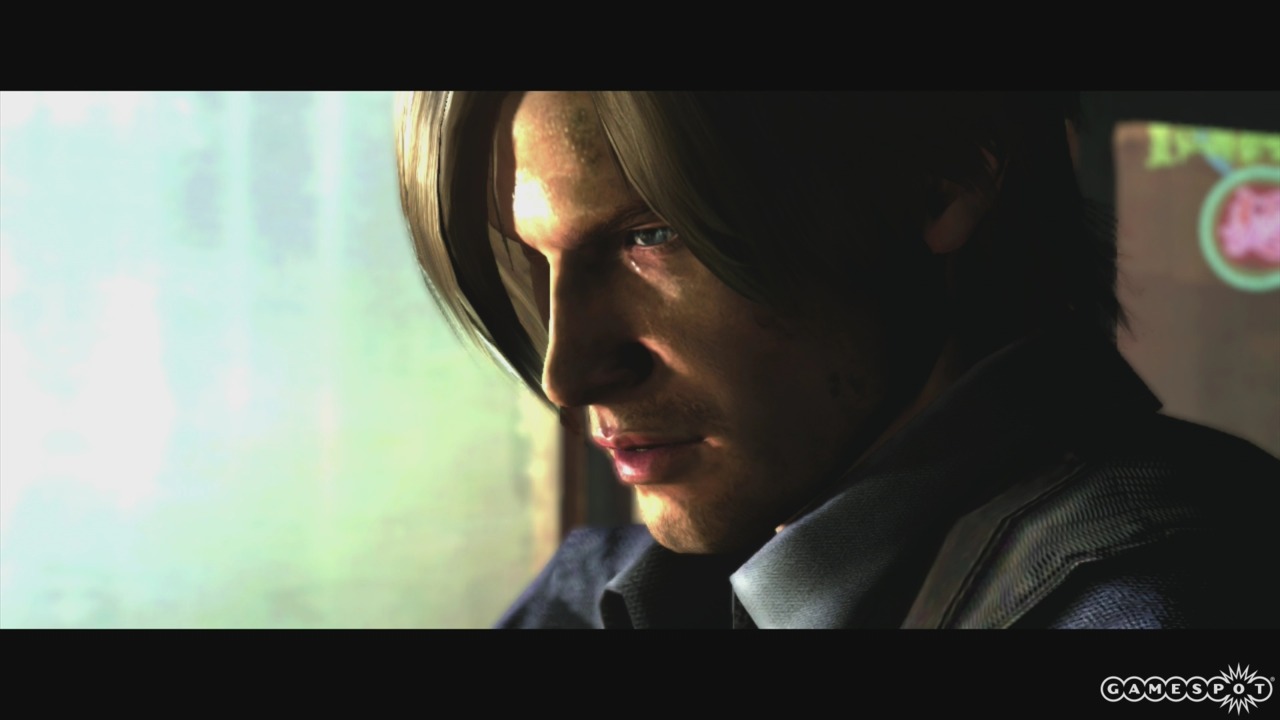With Resident Evil 6, a once-mighty series makes another stumble. From a production standpoint, this atmospheric third-person shooter (this is no survival horror game, certainly) hits a number of high notes, weaving multiple stories into a single narrative that you untangle from different perspectives. It's unfortunate that actually interacting with Resident Evil 6 is an excruciating chore. This is a wannabe action film that resents your interference, and punishes you by forcing one horrible quick-time event after another upon you.
That Resident Evil 6 wants to be a movie is evident in almost every facet of its gameplay. Plenty of games dramatize their events through extended cutscenes, Metal Gear Solid being an oft-cited example of a series known for long-winded cinematics. Having many cutscenes isn't a problem in and of itself; constantly interrupting the flow of gameplay, on the other hand, is Resident Evil 6's disappointing calling card.
In a typical five-minute stretch, you might watch a cutscene, walk for five seconds, trigger another cutscene, open a door, perform a quick-time event, view another cutscene, shoot some mutated freaks, and then do nothing while you wait for your co-op partner to finish some task or another before you can continue on. All through that stretch, the camera changes position countless times, you're forced to walk really slowly for a while, and an almost-unavoidable scripted "gotcha" moment gifts you with a game-over screen ("You Are Dead"), forcing you to replay the sequence while wondering what you could have done to prevent it.
These problems infiltrate all four of Resident Evil 6's campaigns, though each campaign shifts its focus and tone--and all but Ada Wong's puzzle-driven campaign (unlocked when you have finished the other three) feature cooperative play. In Leon Kennedy's campaign, you play as either Leon or newcomer Helena Harper, while your cohort is left to the care of another player, or of the AI. Leon's campaign is the most traditional, recalling the fourth and fifth chapters of the series by way of mysterious locations like an eerie graveyard and creep-strewn city streets. In a campaign that looks to military shooters for inspiration, Chris Redfield joins fellow BSAA operative Piers Nivens in war-torn streets to shoot up infected foes and larger-than-life bosses. Jake Muller and Sherry Birkin's campaign is focused more on scripted events than the others and lacks the thematic cohesion of the other three (unless you count an overload of contextual button prompts as a theme). A short prelude introduces you to the basic mechanics, which are mostly identical across the campaigns. It also functions as a warning of what's to come.

Right off the bat, you notice what is to be a common theme in Resident Evil 6: quick-time events are prominent to the point of distraction. Keep your thumbs limber and your trigger fingers ready, for you will be hammering buttons and jiggling thumbsticks ad nauseam. Wiggle that stick to get the monster off you! Furiously tap that button to crawl faster! Making matters worse is that the quick-time events aren't even that well implemented. Some of them require superhuman wiggling speeds; others, like those that require alternating trigger presses, don't have a clear rhythm. And succeeding means triggering a sonic zing and a bright circular eruption that distract you from the dramatic animations.
Even ignoring quick-time events, button prompts are the rule rather than the exception. Capcom drops in so many set piece moments that they lose their luster. Good set pieces--that is, large scale events with major visual punch and limited interactivity--punctuate gameplay, rather than replace it. Here, they constantly disrupt the gameplay, and a few types of set pieces emerge as clear developer favorites. One such type is the "run toward the camera" bit, in which you hold a button to sprint toward the camera, and press buttons to leap over obstacles or slide under them. It takes a special talent to make such sequences work, but no such talent is demonstrated here; the camera constantly changes position, which destroys the flow of both the controls and the visuals.

Resident Evil 6 is constantly (and annoyingly) playing with camera angles, even outside of the running sections. The worst moments are those that yank control from you and force you to stare at a growling behemoth's dramatic entrance, or a helicopter's flyover, even when you're in the middle of a quick-time event, or engaged in a shoot-out. Smart games either have you hold a button if you want to witness a major incident, or simply allow the incident to happen. Resident Evil 6 is not a smart game. It doesn't care what you're doing: that monster is big, and the game forces the bigness upon you. (And when the sequence is done, the camera may not be in the position in which it started.) Such occurrences are, every time, detrimental to gameplay, and it's shocking how many of them there are.
Not that your co-op partner is usually harmful to the experience. If you play on your own, the AI does a great job of knowing what to do and where to go. The game does have a few good co-op ideas up its sleeve, such as a sequence in which one player swims from the snapping jaws of a finned fiend, and the other must shoot it. But the good ideas are too often let down by troublesome execution: in that same sequence, your mission objective might contradict what the game actually needs you to do. Other times, one player waits around with nothing to do, while the other slashes up bio-organic weapons (that is, B.O.W.s) and finally opens a door or lowers a ladder. Most cooperative actions simply involve opening a door together. And boy is there a lot of door opening in Resident Evil 6.
In between the frequent set pieces, the quick-time events, and the cooperative door kickings, there is some mutant killing. The core mechanics are similar to those in other third-person shooters, but with the idiosyncrasies that defined Resident Evils 4 and 5. The camera stays close behind your back, movements like leaping and crouching are contextual rather than freely available, and the pace is deliberate. Shooting grotesqueries often results in new mutations: bulbous growths sprout from the necks of advancing fiends, and disgusting diminutive creatures spawn from their hosts and skitter along the floor. You can also kick and pummel your foes, though whether you prefer to keep your distance or get right in there, the lumbering lunatics react properly, knocking over other infected as they lurch from the power of your shotgun blasts. If you find the deliberate action appealing, you can devote some time to the returning Mercenaries mode, in which you and a buddy (or you alone) off as many enemies as you can before the clock ticks down to zero.
It's unfortunate that Resident Evil 6's campaigns want so desperately to take you out of the action. A single bullet from a sniper can knock you to the ground; you can either get to your feet and reposition yourself, or just shoot while you're down until the right time to rise presents itself. In Jake's campaign, getting knocked down on a particularly icy slope means sliding all the way to the bottom, and having to make the climb again. As is typical for Capcom action games, long animations need to finish before you regain control--and that kind of approach could have worked fine in a game that sticks closely to the Resident Evil 4 template.
But Resident Evil 6 is focused less on building tension than any previous game in the main series, and the over-deliberate mechanics don't always mesh well with the action-game sensibilities and highly linear levels. The claustrophobic behind-the-back camera in cramped hallways, the knockback loops, the cumbersome method of combining herbs and healing yourself--these facets once worked well to help instill a sense of terror and make you consider every action and every step. In Resident Evil 6, a game that mostly leaves its survival horror roots behind, the same attributes hinder your enjoyment.

That isn't to say that Resident Evil 6 is hard. On medium difficulty, you can often run right past the baddies, or just spam a trigger and punch them to death. You needn't worry about ammo all that often; the only time you're likely to run out is when you face a bullet-sponge boss and there's no more ammo to be had in the battle arena. But while you won't often die due to the level of challenge (unless you crank up the difficulty, of course), you might not be able to escape a few of the game's "gotcha" deaths. With little warning, a vehicle might crash through a barricade, and if you happen to be in the wrong place at the wrong time, you're dead. When an avalanche occurs, if you don't know to expect it, you might not have enough room to veer your snowmobile away. (This is one of several mediocre vehicular segments.) That's not challenging: that's cheap, and it's bad game design.
While Resident Evil 6 is no survival horror game, it does have a few memorably tense moments. In Leon's campaign, flashes of lightning in a dark cemetery might have you jumping once or twice, and the appearance of Resident Evil's famous zombie dogs will have you reliving the franchise's good old days. The visit to an old cathedral that follows is similarly evocative, considering its roots in the series' past. Where the game most impresses is in its production values, particularly in sound and narrative. Each campaign tells a different story--but those four stories overlap in interesting ways before they diverge again. You need to play the unlockable campaign to make sense of every mystery, but this is a great way to learn tall tales of the latest global threat.

Grand voice acting gives the melodramatic story plenty of weight. The talented cast makes every sullen regret, every cry for help, and every enthusiastic encouragement ring true, even in the midst of the most fantastical of events. The gross, squishy sound effects are so potent that you might try to wipe imaginary goo from your clothes. The cutscenes deserve special mention. A slow-motion shot of a bus's interior, a character's shocking fall from a great height, and a tense standoff between allies are but a few examples of the excellent cinematics that drive the story onward.
But how far can cinematics get you when the gameplay sandwiched between them is so poorly paced, so utterly misconceived, so reliant on stick wriggles and button tapping? There's a place for contextual prompts and cinematic storytelling in video games, but Resident Evil 6 is a mishmash of elements put together without any sense of care or direction. Series faithful might stumble through for the sake of story, and perhaps to appreciate those few moments that recall when Resident Evil was at its peak glory. But this long, poor sequel is the ultimate test of patience for even the most dedicated.